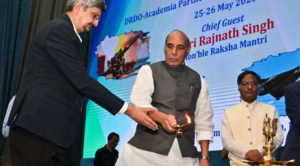Rajnath Singh said it is important that the Defence Research and Development Organisation (DRDO), the country’s premier defence R&D agency, and the academia work in partnership to find solutions to the challenges faced by India.

A technologically advanced military is crucial to protect national interests, more so for a country like India, which faces a double threat on borders and has one of the largest armed forces in the world, Defence Minister Rajnath Singh said on Thursday.
Rajnath said it is important that the Defence Research and Development Organisation (DRDO), the country’s premier defence R&D agency, and the academia work in partnership to find solutions to the challenges faced by India.
“This partnership will prove helpful in making India a leading nation in defence technologies,” he said while inaugurating a two-day DRDO-academia conclave here. The conclave aims to create an interface between DRDO’s requirement and the academia’s capability by a synergistic dialogue between DRDO directors, scientists and academics.
He noted that the path to acquire advanced technologies goes through R&D, which plays a key role in any country’s development.
In the last financial year, the Centre, for the first time, earmarked 25% of India’s defence R&D budget for the industry, start-ups and academia in order to encourage the private industry to invest in defence R&D.
“Unless we do research, we will not be able to adopt new technologies — R&D can convert ordinary substances into valuable resources. It has been a key factor in the development of civilizations throughout history,” Singh said.
The Defence Minister Rajnath said that as partnership between DRDO and the academia reaches new heights, it will unlock the potential of many new resources, which will benefit the country. He also stressed that DRDO will get a skilled human resource base from eminent institutions such as the IISc, IITs, NITs and other universities across the country with this partnership, as these institutions nurture a large pool of talented and skilled youth.
“On the other hand, the academia will benefit from the R&D fund of DRDO, which it spends in developing new technologies, and will also get access to the advanced infrastructure and lab facilities of the defence research organisation,” he said.
Samir V Kamat, Secretary, Department of Defence R&D, and DRDO chairman and other senior government officials were present at the event. Nearly 350 senior academicians from across the country are also attending it.
In a separate event on Thursday, the Defence Minister called upon industry leaders to come up with innovative solutions to help India turn from an ‘imitator’ to a ‘leader’ in futuristic technologies and stay prepared to deal with challenges emanating from the current global security scenario.
He said this while addressing the annual session of Confederation of Indian Industry (CII), the theme for which was ‘Future Frontiers: Competitiveness, Technology, Sustainability and Internationalisation’.
Singh said security equations are changing at an unprecedented pace and countries are focusing more than ever on technological advancements in the fields of artificial intelligence, quantum computing and genetics. He said it is both a challenge to not lag in the race of technology as well as an opportunity of making a mark, with the aim to help the nation leapfrog on the path of progress.
He said R&D in cutting-edge technology is the only way to achieve this goal, and pointed out that this opens new dimensions crucial for the development and security of any nation in today’s times.
Stating that new technological avenues are coming to the fore without any established leader, he called on the industry to strive to make India a technology leader from an imitator. He urged them to increase their in-house R&D funding and make inroads in new and untouched sectors/products/goods and services through new technologies.
He said the key requirements for a nation to become a technology leader, such as a substantial capital, a robust R&D infrastructure, demography as well as the ability to adopt, understand & create a base of previous technologies.
Also read: Rain for Three Days in North India including Delhi






